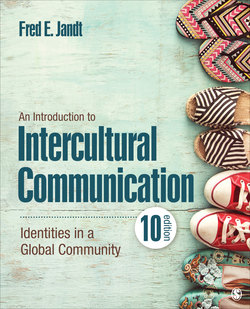Читать книгу An Introduction to Intercultural Communication - Fred E. Jandt - Страница 111
На сайте Литреса книга снята с продажи.
Japanese/English Difficulties With Speech Sounds
ОглавлениеIf you grew up speaking English, certain aspects of the Japanese language are difficult for you to perceive. These aspects do not occur in English, so you never learned to listen for them and you literally do not hear them. For example, vowel length does not matter in English. You could say “Alabama” or “Alabaaama,” and others would know you’re referring to a southern U.S. state. Vowel length is important in Japanese. Japanese has short-duration vowels and long-duration vowels. Vowel length in the following pairs of Japanese words actually determines their meanings:
obasan: aunt
obaasan: grandmother
kita: came
kiita: heard
Because vowel length is not a critical attribute in English, perceiving the difference in sounds is a problem for those attempting to understand Japanese.
Other sounds that present difficulties for English speakers are the following:
Double consonants:
shita: did
shitta: new
Accent:
kaki: oyster
kaki: persimmon
Pitch:
hashi: bridge
hashi: chopsticks
hashi: edge of a table
If you grew up speaking Japanese, some aspects of the English language are difficult for you to perceive. English has some consonant sounds that do not exist in Japanese. If you grew up speaking Japanese, you didn’t learn to listen for those consonant sounds. English uses the consonant sounds f, v, th as in think, th as in breathe, z, zh as in treasure, j as in the dge of judge, r, and 1. Thus, if you grew up speaking Japanese, it is difficult to distinguish between the sounds b and v, s and sh, r and 1, and so forth, with the result that lice and rice or glamour and grammar are frequently pronounced the same way.
Japanese has borrowed thousands of English words. But if you grew up speaking English, you would have difficulty recognizing them. In Japanese, syllables are basically a consonant sound followed by a vowel. Syllables can end only with a vowel sound or an n. For example, the Japanese word iiau (quarrel) has four syllables—each vowel is pronounced as a separate syllable. A native-born English speaker would not know to do that and would try to pronounce the word as an unsegmented single sound. An English speaker pronounces the word thrill as one syllable. In Japanese, consonant sounds do not exist without vowels, so a Japanese speaker would pronounce all three syllables, something like sooriroo. The Japanese r, by the way, is difficult for English speakers. It’s similar to the Spanish r in pero or Roberto. From our first language, we learned what sounds are critical to listen for. Because languages can have different critical sounds, learning a new language means learning to attend to new sounds.
